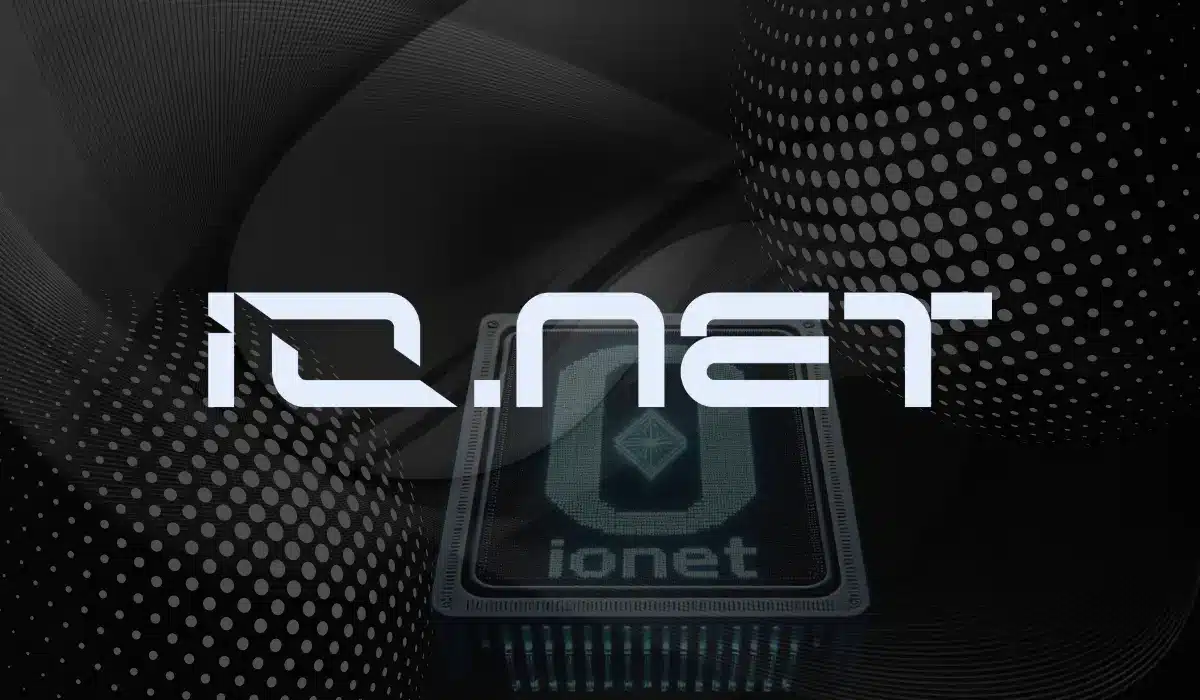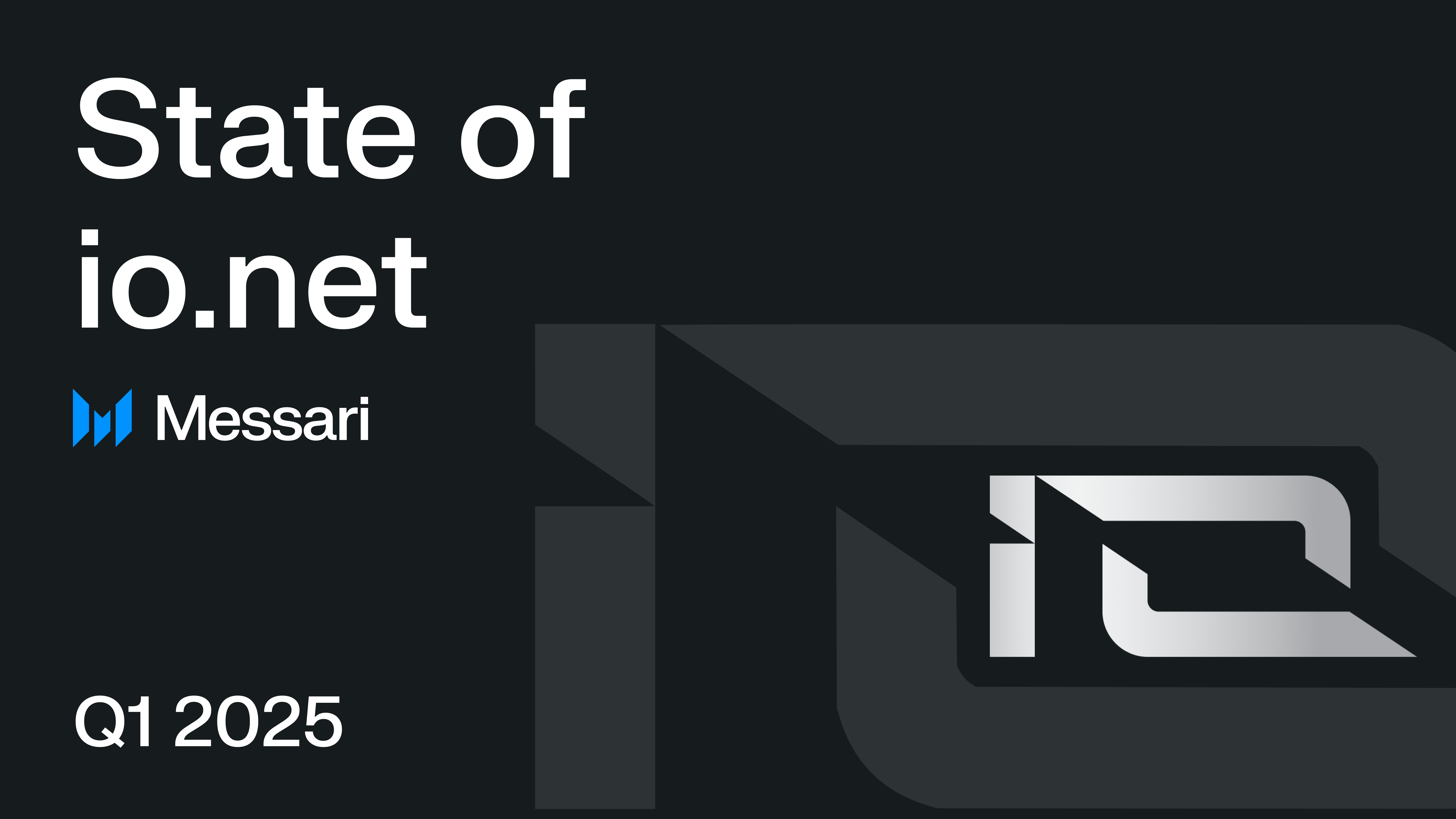IONET CEO Steps Down Amid Growth and Allegations
Sunday, June 9, 2024 2:44 PM
1,016

Ahmed Shadid, co-founder and CEO of IONET, a decentralized AI computing and cloud platform, has resigned amid allegations of fraudulent activities. Shadid’s decision aims to allow the company to grow without distractions. COO and co-founder Tory Green will assume the CEO role. Shadid expressed gratitude to the team and community, donating 1M IO tokens to the ecosystem. IONET’s unique tokenomics and recent selection by Binance as its 55th Launchpool project signal a promising future for the platform.
Related News

5 days ago
io.net Reports Revenue Growth Amid Market ChallengesIn the latest quarterly report, io.net has demonstrated significant growth in revenue, achieving an impressive 82.6% increase, which brought its total revenue to $5.7 million. This surge in revenue is particularly noteworthy given the broader contraction in the cryptocurrency market, where the market cap of its IO token plummeted by 71.4% to $108 million, alongside a 74.9% drop in token price. Despite these challenges, io.net has successfully integrated with various AI and compute-focused platforms, including partnerships with Zerebro, KREA, and Injective, aimed at enhancing decentralized GPU compute capabilities for applications in AI and DeFi.
The infrastructure of io.net, which is built on a decentralized network of GPUs and CPUs, allows for scalable access to compute resources, particularly for machine learning and AI applications. The platform supports a wide array of machine learning frameworks, ensuring flexibility and efficiency in resource allocation. However, the average daily verified compute resources have seen a decline, with verified GPUs and CPUs down 11.1% and 4.5% respectively. This reduction reflects ongoing supply-side challenges and a decrease in token incentives, which has impacted the overall activity within the network.
Despite the mixed performance metrics, io.net has maintained a steady pace of development, with numerous collaborations aimed at expanding its ecosystem. The partnerships formed in Q1 2025, including those with Alpha Network and Mira Network, highlight io.net's commitment to enhancing decentralized AI infrastructure. As the project continues to refine its economic models and expand its network capabilities, it remains a key player in the evolving landscape of decentralized compute resources, even amid a challenging market environment.

5 days ago
Ben Goertzel: Pioneering Decentralized AI for a Better FutureBen Goertzel, a pioneer in artificial intelligence, has been advocating for decentralized AI since he wrote his first line of code 30 years ago. As the world stands on the brink of achieving Artificial General Intelligence (AGI), Goertzel emphasizes the importance of decentralization in ensuring that this powerful technology benefits humanity rather than serving centralized powers. At the recent Consensus conference in Toronto, he expressed optimism that AGI could be launched within the next one to three years through his project, SingularityNET, which aims to create a global marketplace for AI services. The project has made significant strides, including partnerships with Mind Network and Filecoin Foundation, a $53 million investment in a modular supercomputer, and a token merger with Ocean Protocol and Fetch.ai.
Goertzel's vision for decentralized AI is rooted in his early experiences with the internet, which he initially saw as a decentralized platform. However, he notes that the rise of tech giants like Google and Facebook has led to a more centralized internet, which undermines the foundational principles of decentralization. He argues that for AGI to be a force for good, it must be built on decentralized architecture from the outset. This philosophy is reflected in the design of SingularityNET, Hyperon, and the upcoming ASI Chain, which is tailored for decentralized AI applications. Goertzel believes that the trajectory of the post-AGI era will significantly differ based on the role of decentralized ecosystems in its development.
In addition to his work in AI, Goertzel has a history of exploring decentralized money concepts dating back to the 90s. Although he and his peers initially dismissed the practicality of decentralized transactions due to concerns over speed and cost, the emergence of Bitcoin has validated some of his early ideas. He humorously reflects on the missed opportunities of that era, acknowledging that their lack of business acumen prevented them from envisioning the darker applications of decentralized money. Today, Goertzel's commitment to decentralized AI continues to gain traction, positioning him and his initiatives as key players in the evolving landscape of technology and governance.

5 days ago
CUDOS Intercloud April Update: Record Growth and New InitiativesIn April, CUDOS Intercloud celebrated significant milestones and shared impressive metrics in its monthly update. The platform reported a record revenue of $204,505, alongside a remarkable 27% increase in GPU consumption, totaling over 300,000 hours. This growth reflects the rising demand for decentralized computing solutions, with more than 2 million GPU compute hours surpassed. CUDOS emphasized its commitment to transparency by providing real-time metrics on GPU capacity, VM deployment, user growth, and ecosystem spending, showcasing a clear distinction in cloud service delivery.
A notable highlight was the six-month anniversary of CUDOS's partnership with the Artificial Superintelligence Alliance (ASI). During this period, CUDOS has served over 15 million GPU hours and welcomed more than 30,000 users. The collaboration aims to build a decentralized compute layer that supports AI development without centralized bottlenecks. Additionally, CUDOS introduced "One Click Computing," allowing users to deploy AI stacks effortlessly, eliminating the complexities traditionally associated with AI deployment.
CUDOS also participated in the Ai2Peace initiative, focusing on using AI for global good. The platform's community rewards program concluded at the end of April, encouraging user engagement through referrals and feedback. Furthermore, CUDOS was represented at Paris Blockchain Week, where discussions highlighted the importance of permissionless compute access and the potential for blockchain to enhance AI's energy efficiency. As CUDOS continues to innovate and expand its offerings, it aims to foster a more sustainable and accessible computing environment for all users.

6 days ago
IoTeX Launches Staking Program on DePINscan to Enhance User Participation in DePIN EcosystemsOn May 21, 2025, IoTeX, a prominent Layer 1 blockchain designed for decentralized physical infrastructure networks (DePIN), officially launched its Staking Program on DePINscan. This unified staking interface aims to empower users by providing a simplified and trusted gateway to support and earn from innovative DePIN ecosystems. The program initially offers native staking support for Hivello and Functionland, both of which are incubated by IoTeX, along with integrated staking for other projects like Filecoin, Fluence, Swan, and Aethir, in partnership with technical collaborator Parasail.
The launch of the staking program is a significant milestone as it aligns with the maturation of DePIN from a nascent concept to a fully developed industry. Qevan Guo, CTO and Co-Founder of IoTeX, emphasized that this initiative facilitates scalable user participation in real-world infrastructure projects. DePINscan is not merely a dashboard; it represents a gateway to the future of Web3 utility, providing visibility into over 100 projects and an ecosystem value exceeding $1 billion. With the introduction of native and cross-chain staking, token holders can now easily delegate to real-world networks, track rewards, and support aligned DePIN projects.
The integration of high-profile projects like Filecoin and Aethir highlights IoTeX's commitment to fostering open collaboration and chain-agnostic support. All staking operations are secured by Parasail’s robust infrastructure, ensuring reliability and scalability for future partners. Dom Carosa, co-founder of Hivello, expressed enthusiasm about the staking program, noting it as a significant opportunity for users to engage with decentralized infrastructure intuitively and rewarding. IoTeX plans to continue onboarding new projects and providing extensive support through marketing, infrastructure tools, and cross-chain integrations, inviting developers and builders to join their staking program.

7 days ago
Hivello's $HVLO Token Listed on DePINscan, Enhancing DePIN AccessibilityHivello, a decentralized physical infrastructure network (DePIN) aggregator, has announced the listing of its token $HVLO on DePINscan, a prominent analytics platform for DePINs on IoTeX. This strategic move is set to enhance Hivello's visibility within the DePIN and IoTeX ecosystems, allowing users to access information about Hivello and participate in staking directly on IoTeX's Layer 1 blockchain. With the DePIN market projected to grow significantly, this listing positions Hivello at the forefront of a rapidly evolving sector, catering to both crypto enthusiasts and newcomers interested in decentralized infrastructure.
The partnership with IoTeX is a pivotal development for Hivello, as it not only increases the accessibility of $HVLO but also provides users with essential tools and incentives to engage with decentralized networks. Domenic Carosa, Chairman of Hivello, emphasized the importance of this collaboration, stating that it aligns with their mission to onboard Web2 users into the Web3 space. The integration with DePINscan is expected to facilitate a smoother transition for users looking to explore and participate in the DePIN ecosystem, which boasts over 13 million active devices contributing daily.
As DePIN adoption accelerates globally, the collaboration between Hivello and IoTeX signifies a major step toward expanding participation in decentralized infrastructure. Qevan Guo, CTO and Co-Founder of IoTeX, highlighted that this launch represents a convergence of technical innovation and strategic partnerships, ultimately making DePIN more accessible to a broader audience. With the market anticipated to soar from $50 billion in 2024 to $3.5 trillion by 2028, Hivello is well-positioned to capitalize on this growth, fostering a new wave of participation in decentralized technologies.

8 days ago
Qubetics: The Next Crypto to Hit $1?As the digital asset market begins to recover from recent volatility, investors are shifting their focus from speculation to real-world utility and long-term adoption potential. One standout project gaining attention is Qubetics ($TICS), which positions itself as the world's first Web3 aggregator. By combining asset tokenization with a robust marketplace, Qubetics aims to convert physical and digital assets into tradable digital tokens, thus addressing one of blockchain's most pressing challenges. This innovative approach not only enhances accessibility to various asset classes but also empowers businesses and individuals to engage in seamless trading, making Qubetics a key player in the race to hit $1.
In addition to Qubetics, other tokens like Kaspa (KAS) and Theta (THETA) are also gaining traction. Kaspa utilizes a high-throughput blockDAG model to achieve rapid transaction speeds, making it a strong contender for decentralized technology. Meanwhile, Theta focuses on creating a decentralized content delivery network for video streaming, rewarding users who contribute bandwidth. Both projects are backed by passionate developer communities and are carving their own paths towards mass adoption, showcasing unique narratives that set them apart in the competitive crypto landscape.
The Qubetics presale is currently in its 35th stage, with over $17 million raised and a growing number of early adopters. The presale operates on a 7-day cycle, creating continuous price momentum ahead of the mainnet launch in Q2 2025. As the demand for Qubetics continues to rise, it is increasingly viewed as a leading candidate for the next crypto to hit $1, driven by its focus on real-world utility and strategic growth. With its innovative marketplace and cross-chain compatibility, Qubetics is not just another crypto project; it is a potential disruptor in the financial landscape, making it an attractive option for investors looking for long-term gains.
Signup for latest DePIN news and updates